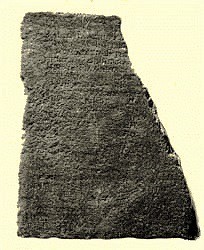Rabbula spent a whole week with the blessed Alexander after witnessing this miracle, receiving instruction in the word of truth in strictest terms. Being convinced of all these matters, he begged for enlightenment about everything else. [....] The men of the city were also witnesses to the miracle, and on seeing the totality of Rabbula's conversion, they came with their wives and children to believe in our lord Jesus Christ—so hot to enter upon the faith that before they had even heard the word of God, they raced to receive the seal of holy baptism.
But the blessed Alexander, desirous of ascertaining the rigor of their belief, told them, "To receive the seal of baptism, first you must demonstrate your faith through works. Therefore if idols are being kept in anyone's house, let them be brought into the open and liquidated by their keepers' hands." Hearing this, everyone hastened to be the first to demonstrate their zeal by pulverizing their own idols. The mysterious ways of God were evident on that day, in that no one wishing to hide their idols under a false show of faith was able to do so, for everyone in the city knew each others' secrets, and so they raced to bring them out under threat of denunciation. In this way, the people were purified together with their homes, and in short order their faith was reinforced, and they proved themselves worthy of the grace of holy baptism.
[....] Alexander was himself the father of a rational flock, and seeing Rabbula well established in his post, and knowing him to be capable of leading others to God, such that all would come to follow him in due time, he exulted in his heart, fully satisfied by these accomplishments that "for one who believeth, all things are possible," and that Master God is disposed to give the right things to those who ask Him. And he considered what else he might request of the complaisant Christ.
The people of the city loved Alexander so exceedingly, desiring him to be their pastor, that they set in motion every tactic of keeping him with them. Knowing this, he made plans to leave the city in secret. But the people found this out, and so as not to lose their true father, they surveilled him night and day and posted guards at the city gate. So the blessed one, being unable to talk his way out of the city, had his disciples lower him from the wall in a wicker basket, just like the blessed Paul who exited the city [of Damascus] in the same way.






